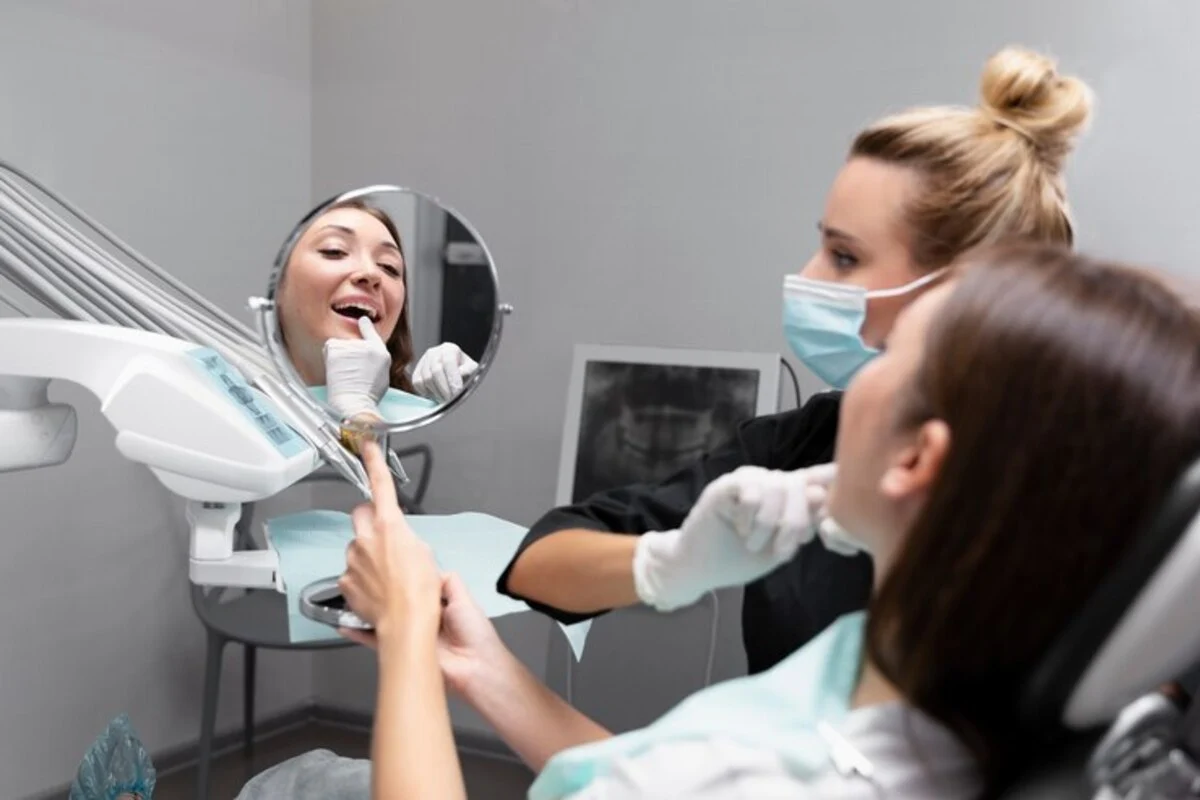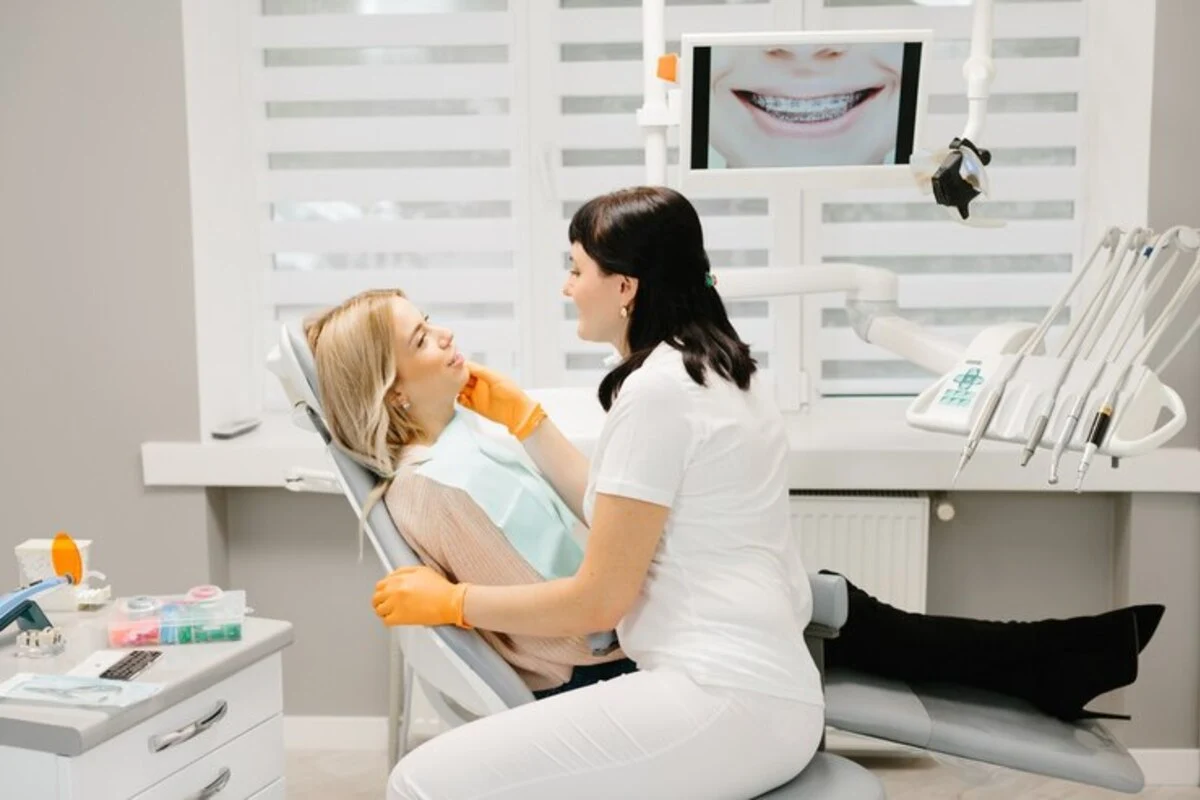Maintaining optimal dental health is crucial during pregnancy, not just for the mother’s well-being but also for the unborn child.
Understanding the Importance of Dental Health During Pregnancy
Pregnancy brings significant hormonal changes that can affect the oral environment, potentially leading to dental problems that might affect the pregnancy’s outcome. This section explores why dental health is paramount during this critical time and how it impacts both maternal and fetal health. Be with Fortune smiles dental care clinic to achieve special information about this topic.
Hormonal Changes and Oral Health
During pregnancy, elevated levels of hormones such as estrogen and progesterone increase the gums’ sensitivity to plaque, leading to a higher risk of periodontal diseases.
These hormonal changes can cause pregnancy gingivitis, characterized by swollen, red, and bleeding gums. If left untreated, gingivitis can progress to more severe forms of gum disease, which have been linked to adverse pregnancy outcomes, including preterm birth and low birth weight.
The Link Between Oral Health and Pregnancy Complications
Emerging research suggests a correlation between periodontal disease and pregnancy complications such as preeclampsia and gestational diabetes.
Periodontal disease is thought to release inflammatory agents into the bloodstream that can contribute to these conditions. Therefore, managing gum health is not only a matter of dental care but also a preventative measure for maintaining overall pregnancy health.
Nutrition and Oral Health
Pregnancy is a time when nutritional needs are heightened, both for the development of the baby and the well-being of the mother. However, cravings and increased consumption of carbohydrates can lead to an increased risk of tooth decay if dental hygiene is not adequately managed.
It’s essential for pregnant women to be mindful of their diet and its impact on dental health, emphasizing foods that promote oral health and reduce decay risk, such as dairy products for calcium and phosphorous, crunchy vegetables for their fibrous texture that helps clean teeth, and vitamin C-rich fruits to strengthen gums.
Oral Hygiene Practices During Pregnancy
Maintaining a rigorous oral hygiene routine is vital during pregnancy. This includes brushing at least twice a day with fluoride toothpaste, flossing daily, and using an antimicrobial mouthwash to help reduce plaque buildup. Pregnant women should also be aware of the symptoms of dental issues, such as persistent bad breath, loose teeth, or new gaps between teeth, which could indicate underlying problems that need professional attention.
Regular Dental Check-ups

Regular check-ups with a dentist are crucial during pregnancy. These visits allow for the early detection and management of oral health issues before they become severe. Dental professionals can also provide guidance on adjusting oral hygiene practices to address the changing needs during pregnancy.
It’s recommended that dental cleanings and routine care continue during pregnancy, but always with the dentist aware of the patient’s pregnant status to adapt care protocols and avoid any treatments that could harm the fetus.
In conclusion, understanding the connection between dental health and pregnancy is the first step towards ensuring a healthy pregnancy journey. Good oral hygiene not only protects the mother’s dental health but also plays a significant role in her overall health and the health of her baby.
Awareness and proactive management of oral health during pregnancy can lead to a smoother pregnancy and a healthier start for the baby. This comprehensive approach to dental care is essential for anticipating the changes pregnancy brings and mitigating any potential health risks associated with poor oral health.
Common Dental Concerns and Treatments for Pregnant Women
Pregnancy introduces unique challenges to dental health, with several common concerns that can arise due to hormonal changes and increased susceptibility to oral diseases. Understanding these concerns and the appropriate treatments available is crucial for ensuring both the health of the mother and the safety of the unborn child. This section explores some of the most prevalent dental issues during pregnancy and their recommended treatments.
Gingivitis and Periodontal Disease
As mentioned, pregnancy gingivitis is a common condition characterized by inflammation of the gums which can bleed easily. If untreated, gingivitis can escalate into periodontal disease, a more serious infection that affects the gum tissue and the bones supporting the teeth.
- Treatment: The primary treatment for gingivitis involves professional dental cleanings, coupled with enhanced at-home oral hygiene routines. Dentists may recommend more frequent cleanings during pregnancy to manage gingivitis effectively. For cases that progress to periodontal disease, more intensive treatments such as scaling and root planing may be necessary. These procedures are safe during pregnancy and can significantly reduce the risk of adverse pregnancy outcomes linked to periodontal disease.
Tooth Decay
Pregnant women may be more prone to cavities due to changes in eating habits, such as increased snacking and consumption of sugary foods, and morning sickness, which exposes teeth to gastric acid.
- Treatment: Preventing tooth decay involves regular dental check-ups, fluoride treatments, and maintaining an excellent oral hygiene routine. In cases where decay is present, fillings can be safely placed during pregnancy. The second trimester is generally the best time for undertaking minor dental procedures, including fillings, to minimize discomfort and avoid any potential risks to the fetus.
Pregnancy Tumors
In some cases, pregnant women develop “pregnancy tumors” (pyogenic granuloma), which are non-cancerous inflammatory growths that occur on the gums. These are usually related to excess plaque and generally recede after giving birth.
- Treatment: Treatment of pregnancy tumors typically involves maintaining oral hygiene to reduce plaque buildup. If the tumor interferes with eating or oral hygiene, it may be removed through a minor surgical procedure. This procedure is safe during pregnancy and can provide relief from symptoms.
Erosion of Tooth Enamel
Frequent vomiting associated with morning sickness can lead to the erosion of tooth enamel, increasing sensitivity and vulnerability to decay.
- Treatment: To manage enamel erosion, pregnant women are advised to rinse their mouths with water or a fluoride mouthwash after vomiting and wait at least an hour before brushing to avoid damaging the softened enamel. Applying fluoride gel or varnish, as recommended by a dentist, can also help protect the teeth from further erosion.
Considerations for Dental Treatment During Pregnancy
- Timing of Treatments: While dental treatments are generally safe during pregnancy, elective procedures should ideally be postponed until after birth. Emergency procedures can be performed at any time during the pregnancy, but the second trimester is optimal for necessary treatments.
- Use of Anesthetics: Local anesthetics, like lidocaine, can be used safely during pregnancy. However, it is important to use the minimal effective dose and to ensure the dentist is aware of the pregnancy.
- X-Rays: Dental X-rays are considered safe during pregnancy when proper shielding is used, although they are typically avoided unless absolutely necessary.
In conclusion, addressing common dental concerns during pregnancy involves a combination of preventive care and safe, timely treatments. Pregnant women should be proactive in their dental care and consult with their dentist and healthcare provider to tailor treatments according to their specific health needs and stages of pregnancy.
Effective management of dental health during this period not only ensures the well-being of the mother but also sets the foundation for the health of the unborn child.

Safe Dental Practices and Procedures During Pregnancy
Maintaining oral health during pregnancy is not only about addressing current issues but also ensuring that dental practices and procedures are safely executed to protect both the expectant mother and the fetus.
This section will discuss various safe dental practices, the best timing for dental treatments, and guidelines to ensure dental procedures during pregnancy are conducted with utmost care.
Best Practices for Dental Care During Pregnancy
Pregnancy requires a gentle, informed approach to dental care. Here are some guidelines and practices recommended for dental treatments during pregnancy:
- Communication: It’s crucial for pregnant women to inform their dentist about their pregnancy as early as possible. This allows the dentist to modify treatment plans and take extra precautions to ensure the safety of both mother and child.
- Preventive Dental Work: Routine dental cleanings and exams are not only safe but recommended during pregnancy. These preventive measures help avoid oral infections like gingivitis, which could affect the health of the pregnancy.
- Elective Procedures: While routine dental work is safe, elective procedures, such as cosmetic dentistry or non-urgent dental surgeries, should be postponed until after the delivery. This approach minimizes any risks to the fetus and avoids unnecessary exposure to medications or stress.
Timing of Dental Treatments During Pregnancy
The timing of dental treatments during pregnancy is important to minimize risks:
Read it: Preventative Dentistry
- First Trimester: The first trimester is a critical time for the development of the fetus. Therefore, routine dental treatments should be postponed if possible to avoid any potential risks. However, emergency dental care is safe and necessary if it contributes to the overall health of the mother and prevents more serious complications.
- Second Trimester: The second trimester is generally considered the safest period for performing necessary dental treatments. The discomfort of dental procedures is usually more manageable during this stage, and the risk to the fetus is lower compared to the first trimester.
- Third Trimester: While dental treatments can be performed safely in the third trimester, they might become more uncomfortable due to the increased size of the uterus, which can make lying back in the dental chair for extended periods challenging. Non-urgent treatments during this time are often postponed until after birth to ensure comfort and avoid any stress that could potentially induce early labor.
Use of Medications and Anesthetics in Dental Care
When dental procedures are necessary, the use of certain medications and anesthetics needs careful consideration:
- Local Anesthetics: Lidocaine, with or without epinephrine, is commonly used and generally safe during pregnancy. It numbs the area being treated and minimizes pain without significant risk to the fetus.
- Antibiotics: If an infection requires antibiotic treatment, medications such as penicillin, amoxicillin, and clindamycin are considered safe for use during pregnancy.
- Pain Management: For pain relief, acetaminophen is typically recommended. NSAIDs (like ibuprofen) and aspirin should be avoided, especially during the third trimester, as they can affect fetal development and lead to complications.
Radiation Safety
While dental X-rays are considered safe during pregnancy when proper shielding (such as lead aprons) is used, they are usually recommended only when essential for diagnosing conditions that cannot be evaluated by visual inspection alone. Modern dental X-ray machines emit very low levels of radiation, and the use of a leaded thyroid collar can provide additional protection for the throat area.
In conclusion, while maintaining oral health during pregnancy involves navigating certain challenges, adhering to safe dental practices ensures the well-being of both the mother and the unborn baby.
Regular communication with dental professionals, appropriate timing for necessary treatments, and careful use of medications are key elements of a safe and effective dental care plan during pregnancy. These precautions help ensure that dental health remains an integral part of prenatal care, contributing to a healthy pregnancy outcome.

